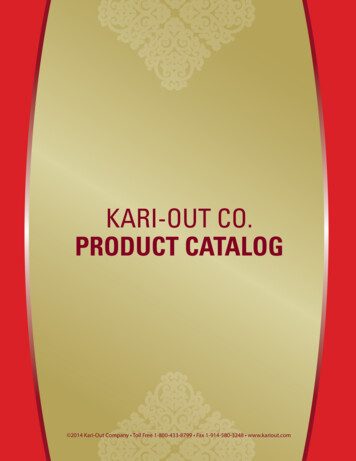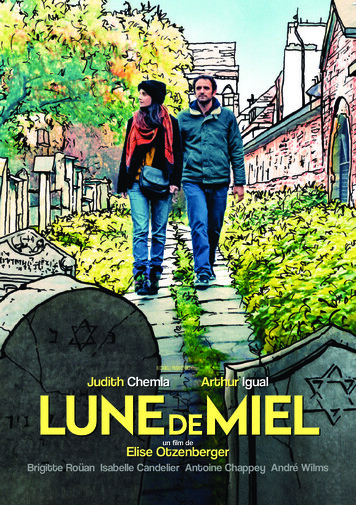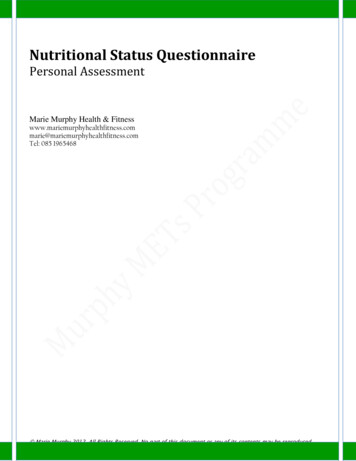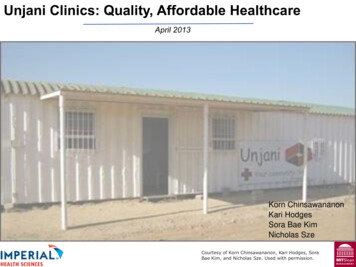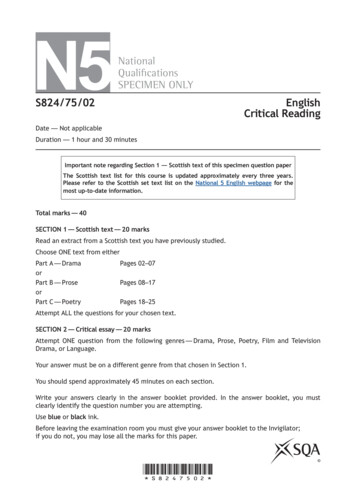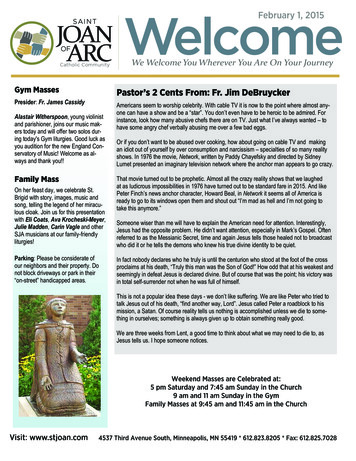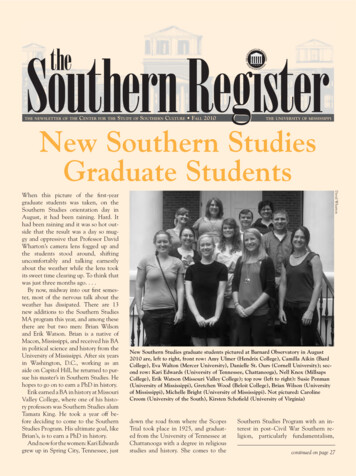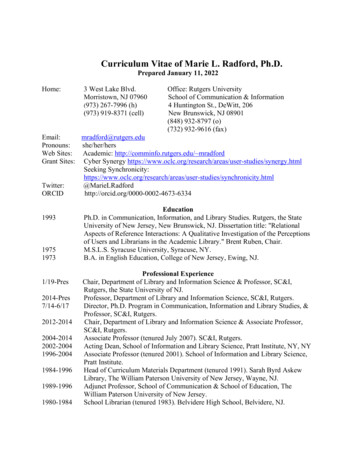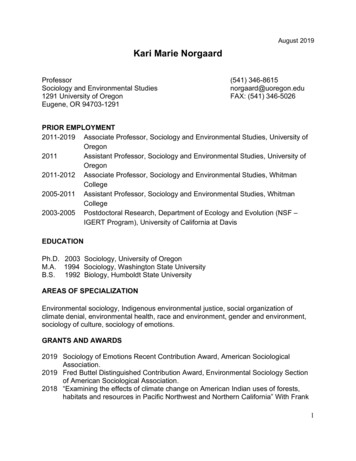
Transcription
August 2019Kari Marie NorgaardProfessorSociology and Environmental Studies1291 University of OregonEugene, OR 94703-1291(541) 346-8615norgaard@uoregon.eduFAX: (541) 346-5026PRIOR EMPLOYMENT2011-2019 Associate Professor, Sociology and Environmental Studies, University ofOregon2011Assistant Professor, Sociology and Environmental Studies, University ofOregon2011-2012 Associate Professor, Sociology and Environmental Studies, WhitmanCollege2005-2011 Assistant Professor, Sociology and Environmental Studies, WhitmanCollege2003-2005 Postdoctoral Research, Department of Ecology and Evolution (NSF –IGERT Program), University of California at DavisEDUCATIONPh.D. 2003 Sociology, University of OregonM.A. 1994 Sociology, Washington State UniversityB.S. 1992 Biology, Humboldt State UniversityAREAS OF SPECIALIZATIONEnvironmental sociology, Indigenous environmental justice, social organization ofclimate denial, environmental health, race and environment, gender and environment,sociology of culture, sociology of emotions.GRANTS AND AWARDS2019 Sociology of Emotions Recent Contribution Award, American SociologicalAssociation.2019 Fred Buttel Distinguished Contribution Award, Environmental Sociology Sectionof American Sociological Association.2018 “Examining the effects of climate change on American Indian uses of forests,habitats and resources in Pacific Northwest and Northern California” With Frank1
0720072007200620062006200520052005200420031Lake, Kathy Lynn and Jonathan Long, Northwest Climate Science Center( 74,000)Chair, Section on Environmental Sociology, American Sociological AssociationFaculty Excellence Award, University of Oregon ( 20,000)Climate Adaptation Planning, Department of Energy on behalf of Karuk Tribe( 250,000) 1PG and E Resilient Communities on behalf of Karuk Tribe ( 99,998)Climate Vulnerability Assessment, Bureau of Indian Affairs on behalf of KarukTribe ( 57,000)WSU Advance Mentoring Program in tandem with Dr. Emily Huddart KennedyExcellence Award for Outstanding Mentor in Graduate Studies, University ofOregon Graduate SchoolFaculty Research Award, University of OregonNPLCC Tribal Climate Change Grant, “Preserving Tribal Self-Determination andKnowledge Sovereignty While Expanding the Use of Tribal Knowledge andManagement in Off-Reservation Lands in the Face of Climate Change,” US Fishand Wildlife Service on behalf of Karuk Tribe ( 34,386)Tribal Wildlife Grant, U.S. Fish and Wildlife Service on behalf of Karuk Tribe andConfederated Tribes of Umatilla Indian Reservation ( 100,000)Perry Research Award, Whitman College ( 8,000)Teaching Innovation Grant, Whitman College ( 20,000 to conduct Klamath FieldInstitute)Abshire Research Award, Whitman CollegePerry Research Award, Whitman College ( 8,000)Karuk Tribe of California, Department of Natural Resources ( 10,000)Perry Research Award, Whitman College ( 8,000)Yurok Tribe, Fisheries Program ( 10,000)Karuk Tribe of California, Department of Natural Resources ( 10,000)Distinguished Contribution to Sociological Practice, Pacific SociologicalAssociationFriends of the River Foundation ( 10,000)Karuk Tribe of California, Department of Natural ResourcesKaruk Tribe of California, Department of Natural ResourcesMarvin E. Olsen Graduate Student Paper Award for Environmental Sociology(awarded by the Environment and Technology Section of the ASA).Tribal grants are co-written with Karuk Tribal grant writer2
BOOKSSalmon and Acorns Feed Our People: Colonialism, Nature and Social Action, RutgersUniversity Press, 2019Living in Denial: Climate Change, Emotions and Everyday Life MIT Press, 2011(Honorable Mention, Alan Schnaiberg Publication Award 2012, nominatedDistinguished Scholar Book Award, ASA, 2012).Reviewed in: Global Environmental Politics, Contemporary Sociology, EcologicalEconomics, Environment, Science of the Total Environment, Review of Policy Research,Organization and Environment, Nature Climate Change, Ecopsychology, AlternativesJournal.WORK IN PROGRESSAllison Ford and Kari Marie Norgaard “Whose Everyday Climate Cultures?” underreview for special issue of Climatic Change on Everyday Climate CulturesJames Fenelon and Kari Marie Norgaard forthcoming “Towards An IndigenousEnvironmental Sociology” Springer Handbook of Environmental Sociologyedited by Beth Caniglia, Andrew Jorgenson, Stephanie Malin, Lori Peek andDavid PellowPEER REVIEWED PUBLICATIONS:(student co-authors are underlined)JM Bacon and Kari Marie Norgaard forthcoming “Emotions and EnvironmentalJustice” Lessons in Environmental Justice: From Civil Rights to Black Livesand Idle No More (ed) Michael Mascarenhas, Sage Publishing.Brulle Robert and Kari Marie Norgaard 2019 Climate Change and Cultural InertiaEnvironmental Politics pp 1-23 DOI: 10.1080/09644016.2018.1562138Norgaard, Kari Marie 2018. “The Sociological Imagination in a Time of ClimateChange” Global and Planetary Change 163: 171-176.Norgaard, Kari, Ron Reed and JM Bacon, 2018 “How Environmental DeclineRestructures Indigenous Gender Practices: What Happens to KarukMasculinity When There Are No Fish?” Sociology of Race and Ethnicity 4(1):98-113.Norgaard, Kari and Ron Reed 2017. “Emotional Impacts of Environmental Decline:What Can Attention to Native Cosmologies Teach Sociology About Emotionsand Environmental Justice,” Theory and Society 46(6): 463-495.3
Willette, Mirranda, Kari Marie Norgaard and Ron Reed 2016. “You Got to Have Fish:Families, Environmental Decline and Cultural Reproduction” Families,Relationships and Societies 5(3): pp. 375-392.Norgaard, Kari Marie 2014 “The Politics of Fire and the Social Impacts of FireExclusion on the Klamath” Humboldt Journal of Social Relations 39: 73-97Sutton, Barbara and Kari Marie Norgaard. 2013 "Cultures of Denial: AvoidingKnowledge of State Violations of Human Rights Violations in Argentina andthe United States." Sociological Forum 28(3): 495-524Davis, Emily, Aaron David, Kari Norgaard, Timothy Parker, Kara McKay, Toz Soto,Cristine Tenant, Kate Rowe and Ron Reed. 2013. “Distribution, Abundanceand Population Age Structure of Freshwater Mussels in the Klamath andSalmon Rivers of Northern California” Northwest Science 87(3): 189-206.Norgaard, Kari, Spenser Meeks, Brice Crayne and Frank Dunnivant 2013. "TraceMetal Analysis of Karuk Traditional Foods in the Klamath River" Journal ofEnvironmental Management 4: 319-328.Norgaard, Kari Marie 2012 “Climate Denial and the Construction of Innocence:Reproducing Transnational Privilege in the Face of Climate Change” Race,Gender & Class 19 (1-2): 104-130.Alkon, Alison and Kari Marie Norgaard 2009. “Breaking the Food Chains: AnInvestigation of Food Justice Activism” Sociological Inquiry 79(3): 289-305.Hormel, Leontina and Kari Marie Norgaard 2009 “Bringing the Salmon Home! KarukChallenges to Capitalist Incorporation” Critical Sociology 35(3): 343-366.Norgaard, Kari Marie. 2007 “The Politics of Invasive Weed Management: Gender Raceand Risk Perception in Rural California.” Rural Sociology 72(3): 450-477.Norgaard, Kari Marie. 2006. “People Want To Protect Themselves A Little Bit” Emotions,Denial and Social Movement Non-Participation The Case of Global ClimateChange.” Sociological Inquiry 76(3): 372-396.Norgaard, Kari Marie. 2006. ‘We Don’t Really Want to Know’ The Social Experience ofGlobal Warming: Dimensions of Denial and Environmental Justice” Organizationand Environment 19(3): 347-470.Norgaard, Kari Marie and Richard York, 2005 “Gender Equality and Nation StateEnvironmentalism” Gender and Society 19(4): 506-522.4
Norgaard, Kari Marie. 1999. “Moon Phases, Menstrual Cycles and Mother Earth: TheConstruction of a Special Relationship Between Women and Nature,” Ethics andthe Environment 4(2): 197-209.Norgaard, Kari Marie. 1996. "Explorations of Nature and Culture: Ecological Feminism andthe Enrichment of Human Ecology," Advances in Human Ecology, Volume 5.BOOK CHAPTERS(student co-authors are underlined)Allison Ford and Kari Marie Norgaard, Loanwords to Live With: An Encyclopedia LexiconAgainst the Anthropocene (ed) Matthew Schneider-Mayerson Chantel Bilodeau,Brent Ryan Bellamy University of Minnesota Press.Allison Ford and Kari Marie Norgaard “From Denial to Resistance: How Emotions andCulture Shape Our Responses to Climate Change” pp. 219-242 in Climate andCulture: Multidisciplinary Perspectives of Knowing, Being and Doing in a ClimateChange World, Cambridge University Press.“Salmon, Fire and the Environmental and Political Contexts of Tribal Health” Chapter 38,pp 401-410 in Jonathan Garcia and Richard Parker (eds) Routledge Handbook onthe Politics of Global Health Taylor and Francis, 2019“Accounting for Emotions and Culture in Sustainable Design” Allison Ford and Kari MarieNorgaard Chapter 28, pp 387-398 in Rachel Beth Egenhoefer (ed) RoutledgeHandbook of Sustainable Design, Routledge, 2017“Imagination, Responsibility and Climate Change” pp 172-188 Afterward to FrankDunnivant, Environmental Success Stories: Solving Major Ecological Problems andConfronting Climate Change Columbia University Press, 2017“The Politics of Invasive Weed Management: Gender, Race and Risk Perception in RuralCalifornia” REPRINTED pp 337-362 in The Earthscan Reader on Gender andForests (ed) Carol J. Pierce Colfer, Marlène Elias, Bimbika Sijapati Basnett, SusanHummel Routledge, 2017.“Mitigating Climate Change: Sociological Perspectives” with Karen Erhardt-Martinez,Thomas Rudel and Jeffrey Broadbent in Dunlap, Riley E. and Robert J. Brulle(eds.). 2015. Sociological Perspectives on Climate Change (Report of the ASATask Force on Sociology and Global Climate Change). New York: Oxford UniversityPress, pp. 199-234.“Denial and the Norwegian Paradox: Climate Change, Emotions and Everyday Life” 2014in Hev stemmen! En Klimaguide til Oilstat edited by Jostein Gaarder, GunnhildStordalen, Pål Prestrud, Frode Fanebust, Lan Marie Nguyen Berg, Aleksander Melli5
(Title translation: “Raise Your Voice: A Climate Guide to the Oil state”). CappelenDamm AS Oslo: Norway“Normalizing the Unthinkable: Climate Denial and Everyday Life” Kenneth Gould andTammy Lewis, editors Twenty Lessons in Environmental Sociology, 2nd edition,Oxford University Press, 2014Alkon, Alison Hope and Kari Marie Norgaard “Breaking the Food Chains: An Investigationinto Food Justice Activism REPRINTED” in Leslie King and Deborah McCarthy(eds) Environmental Sociology: From Analysis to Action, pp 111-126 Rowman &Littlefield Publishers, 2013Norgaard, Kari Marie “People Want to Protect Themselves A Little Bit” REPRINTED in inLeslie King and Deborah McCarthy (eds) Environmental Sociology: From Analysisto Action, pp 169-186 Rowman & Littlefield Publishers, 2013Norgaard, Kari Marie “The Social Organization of Climate Denial: Emotions, Culture andPolitical Economy” in The Oxford Handbook of Climate Change and Society editedby John Dryzek. Richard Norgaard and David Schlosberg, Oxford University Press,2011.Norgaard, Kari Marie, Ron Reed and Carolina Van Horn, “Institutional Racism, Hungerand Nutritional Justice on the Klamath” in Allison Hope Alkon and Julian Agyermaneditors, Cultivating Food Justice: Race, Class and Sustainability, MIT Press, 2011.Reed, Ron and Kari Marie Norgaard “Salmon Feeds Our People” pp 7-16 in WalkerPainemilla, K., Rylands, A B., Woofter, A., & Hughes, C. eds. Indigenous Peopleand Conservation: From Rights to Resource Management. ConservationInternational: Arlington VA, 2010.Norgaard, Kari Marie. “Denied Access to Traditional Foods: Including the MaterialDimension to Institutional and Environmental Racism” pp 265-274 in Race in an Eraof Change: A Reader edited by Barbara Katz-Rothman and Heather DalmageOxford University Press, 2010.Norgaard, Kari Marie. 2009. “People Want to Protect Themselves A Little Bit” in LeslieKing and Deborah McCarthy editors, Environmental Sociology From Analysis toAction Second Edition, Rowan and Littlefield Publishing Group, Lanham, MD(reprinted from Sociological Inquiry 2006).RESEARCH REPORTS:Norgaard, Kari Marie and William Tripp (Lead coordinating authors) “Karuk ClimateAdaptation Plan,” 2019, Karuk ress.com/climate-adaptation-plan/6
“Electrical Ignitions, Wildfire Risk and Community Climate Adaptation in NorthernCalifornia,” 2018, Karuk Tribe, PG&E Resilient Communities 56pp.“Karuk Tribe Climate Vulnerability Assessment: Assessing Vulnerabilities From theIncreased Frequency of High Severity Fire,” Karuk Tribe, 204pp, ess.com/climate-vulnerabiltyassessment/“Karuk Traditional Ecological Knowledge and the Need for Knowledge Sovereignty:Social, Cultural and Economic Impacts of Denied Access to TraditionalManagement.” Karuk Tribe, 2014 available online aining Knowledge Sovereignty: Practical Steps Towards Expanding the Application ofKaruk Traditional Knowledge in the Face of Climate Change” Karuk Tribe, 2014available online ss.com/retaining-knowledgesovereignty/Behavioral Challenges in Responding to Climate Change, Concept Note for WorldDevelopment Report, World Bank, 2009.Preliminary Social Impact Assessment Report, Karuk Tribe of California 2007Healthy River, Healthy People: The Relationship Between Riverine and Human Health onThe Klamath River Written in conjunction with Yurok Tribe. filed November 2006with Federal Energy Regulatory Commission on Behalf of the Yurok Tribe in theKlamath River Project re-licensing process.Subsistence and Native American Beneficial Uses of the Klamath River 2006 Report toCalifornia Northwest Regional Water Quality Control Board on behalf of the KarukTribe of California.The Effects of Altered Diet on the Health of the Karuk People Karuk Tribe of California,2005. Filed November 2005 with Federal Energy Regulatory Commission on Behalfof the Karuk Tribe in the Klamath River Project re-licensing process.The Effects of Altered Diet on the Health of the Karuk People: A Preliminary Report KarukTribe of California, 2004. Filed August 2004 with Federal Energy RegulatoryCommission on Behalf of the Karuk Tribe in the Klamath River Project re-licensingprocess.Learning from the Past: Timber and Economic Well-Being in Siskiyou County KlamathForest Alliance, Etna, CA. 19967
NON-REFEREED PUBLICATIONSNature, Culture and the Production of Race 2019 Sociology of Culture Section ng Space for Indigenous Sociology Within the Discipline” 2018 September-Octoberissue of ASA Footnotes ithin-discipline“Climate Change is a Social Issue” Invited contribution for The Chronicle of HigherEducation January 17, 2016 cial/234908“Climate Debate Isn’t So Heated in US” invited blog post, New York Times Room forDebate May 8, 2014 imatedebate-isnt-so-heated-in-the-us“Climate Denial, Emotions and Everyday Life in Norway and the U.S.” 2014 Tvergastein(journal published by, Center for Development and the Environment, University ofOslo). Invited contribution for special issue “Adaptation (and its limits)" 3(1): 56-63“The Everyday Denial of Climate Change” July 5, 2012 Bulletin of Atomic ons of Climate Apathy” blog post for Mobilizing Ideas Emotions in SocialMovements Blog -movement-non-participation/“Personal and Political Paralysis” April 22, 2011 Earth Day Blog at MIT Press 04/personal-and-politicalparalysis.htmlFeature Interview 2011 “A Dialog Between Renee Lertzman and Kari Norgaard”Ecopsychology 3(1): 5-9.“Climate Change and the Sociological Imagination” Kari Marie Norgaard and Alan Rudy,ASA Footnotes December 2008 p. 5Encyclopedia Entries: 2007. “Gold,” “Fish Ladders,” “Spotted Knapweed,” “SpeciesInvasions,” “Glen Canyon Dam,” “Global Climate Change,” “Greenhouse Effect,”“Greenhouse Gases,” “Carolyn Merchant.” Encyclopedia of Environment andSociety, Sage Publications.8
Norgaard, Kari. 2003. “Denial Privilege and Global Environmental Justice: The Case ofClimate Change,” Centere for Environment and Development, University of Oslo.Norgaard, Kari. 1998. "The Essentialism of Ecofeminism and the Real," Book ReviewEssay, Organization and Environment, Volume 11, Number 4.INVITED LECTURES AND PRESENTATIONS“Salmon Feeds Our People: Klamath River Dams and Karuk Social Management” withRon Reed, U.C. Berkeley, March 7, 2019“Smoke, Fire, Climate Change and the Revitalization of Indigenous TraditionalManagement” with Ryan Reed Scientists in Synagogues, Temple Beth Israel,Eugene Oregon, January 2019“Whose Energy Future, Whose Imagination? Climate Change and Energy FuturesWorkshop, Memorial University, Newfoundland. October 10, 2018.“Living Climate Change: Experiences of Fear, Guilt and Privilege” Invited PresentationPanel on Feeling Climate Change, American Sociological Association, PhiladelphiaPA August 2018“What Anthropocene, Whose Antropocene? Revitalizing Sociological Theory in the Serviceof Human Survival” Invited Participant Panel on Sociology of the AntropoceneAmerican Sociological Association, Philadelphia PA August 2018“Unsettling Times: Sociological Reflections on Living Well in a Changing ClimateUniversity of California at Davis, May 30, 2018“Land Management as Settler Colonialism” Environmental Justice, Race and Public LandsSymposium, University of Oregon May 11, 2018“Climate Change as Strategic Opportunity: Imagination, Responsibility, and Community”University of Utah, January 2018“Beyond the Climate Elephant: From Climate Denial to Public Engagement” Sydney IdeasLecture, University of Sydney, Sydney Environmental Institute, Sydney Australia,December 2017Public Commentary, Sydney Ideas Lecture, University of Sydney, Sydney EnvironmentalInstitute, Sydney Australia, December 2017“Decolonizing Environmental Justice: Lessons from the Klamath River” EnvironmentalJustice 2017- Looking Back, Looking Forward, University of Sydney, EnvironmentalInstitute, Sydney Australia, December (via webcast) November 20179
“Wildfires, Climate Change and Proactive Tribal Management in the Klamath Basin”American Fire Symposium: Trends in Wildfire, Law, Policy and Science on Publicand Private Lands University of Oregon School of Law, September 29, 2017Karuk Tribe Climate Adaptation Planning Wildland Fire Ecology Conference, May 2017,Orleans, CA“Moving Beyond Climate Denial to an Environmentally Just Future” October 6, 2016 SUNYAlbany, Albany NY“Can Climate Change Be A Strategic Opportunity?: Wildfire, and Climate Justice in theKlamath Basin” September 22, 2016 University of Alaska Southeast, Juneau, AKSociology of Emotions Chair’s Hour “Rethinking Social Movements Emotions,” AmericanSociological Association, Seattle, WA August 22, 2016Presidential Panel: Global Climate Change: The Role of Sociology, Society for the Studyof Social Problems, Seattle WA August 19, 2016“Karuk Tribe’s Climate Change Projects” Keynote Presentation, Tribal EPA Conference,October 13, 2015, Reno NV“Living in Denial: Ten Years Out” Corvallis Chapter of 350.org, Corvallis, OR November17, 2015Indigenous Food Justice on the Klamath, Humboldt State University, Arcata, CA October23, 2015“Living in Denial: Ten Years Out” Senter for Utvikling and Miljo University of Oslo, Oslo,Norway, September 8, 2015“Salmon Feeds Our People: Climate change, health and traditional foods” Lewis-ClarkState College, Lewiston ID September 17, 2015“Living in Denial: Ten Years Out” Washington State University September 18, 2015“Climate Cognition” Commonwealth Club of California Climate One, with George Lakoffand Per Espen Stokness, San Francisco, May 2015“Living in Denial: Ten Years Out” Keynote Talk Nordic Institute for Environmental StudiesSymposium, Mid Swedish University, Sundsval Sweden December 9, 2014Annual Peace and Justice Lecture, East Lansing, Michigan State University November 21,201410
“Living in Denial: Climate Change, Emotions and Everyday Life” Trinity College, DublinIreland October 6, 2014“The Politics of Fire and the Social Impacts of Fire Exclusion” with Ron Reed, HumboldtState University, September 18, 2014 127097“Social Impacts of Fire Exclusion” Conference on Perspectives on the State of Jefferson,University of Oregon May 30, 2014“Living in Denial: Climate Change, Emotions and Everyday Life” Keynote Talk “Humans inthe Arctic How To Create a Climate For Change” Arctic Frontiers Conference,Tromsø, Norway January 22, 2014. http://vimeo.com/85591316“Living in Denial: Climate Change, Emotions and Everyday Life” Keynote Talk ClimateChange and Cinema October 4, 2013 Reykjavik Iceland Living in Denial: Climate Change, Emotions and Everyday Life” University of Oslo, June3, 2013 Oslo Norway“Living in Denial: Climate Change, Emotions and Everyday Life” Keynote TalkSvanekonferansen June 5, 2013 Oslo Norway“Living in Denial: Climate Change, Emotions and Everyday Life” Keynote address ClimateEthics Conference, Prindle Institute, DePauw University, Greencastle, Indiana, April9, 2013 6“Living in Denial: Climate Change, Emotions and Everyday Life” Keynote Talk Challengingthe Climate Consensus, March 7, 2013 Meudon, France.“Climate Change Denial and Everyday Life” session on Countering Denial andManufactured Doubt of 21st Century Science American Geophysical Union, SanFrancisco, CA 2012“Living in Denial: Climate Change, Emotions and Everyday Life” Keynote Lecture,Environmental Policymaking in a Dynamic World, Nordic Institute of EnvironmentalStudies Research Symposium IV, Höfn in Hornafjörður, Iceland May 18, 2012“Living in Denial: Climate Change, Emotions and Everyday Life” Ecology Center, UtahState University, Logan, UT April 24, 2012“Tribal Environmental Justice on the Klamath: An Interdisciplinary View” Ecology Center,Utah State University, Logan, UT April 25, 201211
“Climate Denial and Cultural Inertia” Department of Sociology and Anthropology,University of Bath, March 26, 2012“Climate Denial and Cultural Inertia” (with Robert Brulle and Randy Haluza DeLay)Meeting the Challenge: Essential Psychological and Social Concepts for CollectiveResponse Planet Under Pressure Conference March 26-29, 2012 London, UK“Climate Change, Emotions and Everyday Life” February 17, 2012 Furman University,Greenville South Carolina“Living in Denial: Climate Change, Emotions and Everyday Life” Behavior, Energy andClimate Change Conference, November 30-December 2 2012, Washington D.C.“Climate Change Denial: Organized Counter Movement and Public Apathy” (with RileyDunlap) American Sociological Association Didactic Seminar Las Vegas, NV August20, 2011“Social Science Contributions to Climate Change Research” (with Deborah Rogers) UNFramework Convention on Climate Change, Subsidiary Body for Scientific andTechnological Advice, Bonn, Germany June 2, 2011“Climate Change, Polar Bears and the Phenomenon of Global Warming Denial” AlaskaWildlife Alliance/University of Alaska Southeast April 22, 2011 Juneau, Alaska“Living in Denial: Climate Change, Emotions and Everyday Life” Conservation LectureSeries, Whitman College April 2011“Imagining the Real: Climate Change, Emotions and Everyday Life” Portland StateUniversity, November 2, 2010“Denial and Climate Change” Invited Panel Presentation “If Rome Is Burning: SociologicalPerspectives on Global Climate Change” Special NSF Reporting Session of theAmerican Sociological Association, Boston, MA August 2008.“The Sociology of Global Climate Change: What We Know and What We Need to Know”Presentation at the National Science Foundation Workshop on SociologicalPerspectives on Global Climate Change (invited participant) Washington D.C. May 30,2008.“Teaching About Global Climate Change,” Invited Presentation, American SociologicalAssociation Boston, MA August 2008.Invited Panel Discussant, “Climate Change and Sustainable Lifestyles” AmericanSociological Association New York City, NY, August 2007.Hurricane Katrina and Environmental Justice, Whitman College, September 200512
The Effects of Altered Diet on the Health of the Karuk People, Environmental LawConference, Eugene Oregon, March 2005“On Salmon and Tribes: The Deterioration of the Salmon Fishery and Health of a NorthernCalifornian Tribe in the Klamath River Watershed” University of California Davis, June2, 2005, webcast of event available at: bes.html.Panel Presentation: “The Cultural and Social Impacts of Dams on the Klamath River”University of Edinburgh, Edinburgh, Scotland, July 20, 2005.Ecological Conversations: Gender, Science and The Sacred, University of Oregon,Eugene, Oregon May 2002.Learning From the Past: Timber and Economic Well-Being in Siskiyou County,Socioeconomic Scoping Workshop, Headwaters Environmental Center, January 23,1998, Ashland, Oregon.SESSIONS ORGANIZEDEnvironmental Sociology Section Sessions: Colonialism, Indigenous Peoples andEnvironmental Sociology, Emotional Politics of Environmental Threats, PublicSociology, Environmental Sociology Roundtables, American SociologicalAssociation, Philadelphia, 2018Teaching Workshop: Teaching Race, Gender, and Colonialism within EnvironmentalSociology, American Sociological Association, Chicago, 2015.Environmental Sociology Regular Session Climate Change, American SociologicalAssociation, New York, 2013.Environmental Sociology Regular Session Race, Gender, Class, American SociologicalAssociation, New York, 2013.Countering Denial and Manufactured Doubt of 21st Century Science AmericanGeophysical Union, San Francisco, CA 2012 Co-organized with Mark McCaffreyMeeting the Challenge: Essential Psychological and Social Concepts for CollectiveResponse Planet Under Pressure Conference March 26-29, 2012 London, UK Coorganized with Heinz Gutscher (Switzerland) and Victor Corral-Verduga (Mexico)Teaching About Global Climate Change American Sociological Association SanFrancisco, CA August 2009OTHER PRESENTATIONS AT PROFESSIONAL MEETINGS SINCE 2005“Karuk Cultural Burning as a Response to Climate Change in the Klamath Basin,” InvitedPanel on Indigenous Cultural Burning with Jessica Conrad, Ryan Reed and BrunoSeraphin, Native American and Indigenous Studies Association, Aotearoa (NewZealand) June 2019.13
“Karuk Tribe Climate Change Adaptation Plan” Department of Energy Tribal ClimateProgram Review, Denver, CO December 2018,“The World Is Closing In on Me: Emotions and Environmental (in)action” With EmilyHuddart Kennedy American Sociological Association, Montreal, August 2017“The Role of Negative Emotions in Shaping Environmental Risk: A Cross-NationalComparison” With Allison Ford, American Sociological Association, Montreal,August 2017“Emotions of Environmental Decline: What Can Native Cosmologies Teach SociologyAbout Emotions and Environmental Justice,” with Ron Reed August, AmericanSociological Association Regular Session on Emotions, August 2016“Retaining Knowledge Sovereignty in the face of Climate Change” with Ron Reed,Alternative Sovereignties Conference, University of Oregon, May 2014“Social Impacts of Fire Exclusion” with Ron Reed, Karuk Tribe of California 2014 KlamathFire Ecology Symposium, Orleans, CA April, 2014“Encounters with Rush Limbaugh: The Use of Sexist Bullying to Control Climate ChangeDialogue in the Public Sphere” Panel on Feminist Justice Work in Academia,Sociologists for Women in Society Winter Meeting, Nashville, TN February, 2014Sutton, Barbara and Kari Marie Norgaard “The Language of Human Rights: Constructionof Memory and Attitudes Towards Future in Contemporary Argentina” InternationalSociological Association, Second Forum of Sociology, Buenos Aires, Argentina,August 1-4, 2012Sutton, Barbara and Kari Marie Norgaard. "I Don't Want to Know': Understanding theDenial of Human Rights Violations (Argentina-United States)," Biennial Conferenceof the International Association of Genocide Scholars, Buenos Aires, Argentina,July 19-22, 2011.“Institutional Racism, Hunger and Nutritional Justice on the Klamath” Association ofAmerican Geographers, Seattle WA April 2011“Environmental Justice and The Racial State: Competing Racial Projects in California’sImpaired Waters” (with Raoul Livianos) Association of American Geographers,Seattle WA April 2011“It’s Illegal to be a Karuk Indian in the 21st Century: Institutional Racism and theProduction of Poverty” Kari Marie Norgaard and Carolina Van Horn, PacificSociological Association, March 2009Teaching about Climate Change Invited paper on special session Teaching About ClimateChange organized by ASA Section on Teaching and Learning American SociologicalAssociation, Boston, MA August 2008Norgaard, Kari and Leora Stein “Climate Change and the Social Organization of Denial. AComparative Study Between Norway and the United States” Pacific SociologicalAssociation, Portland OR March 2008Sutton Barbara and Kari Norgaard “Citizen Perception of State Violence and HumanRights: A Comparative Study Argentina, United States.” Pacific SociologicalAssociation, Portland OR March 2008Norgaard, Kari and Leontina Hormel Bringing the Salmon Home! Karuk Challenges toCapitalist Incorporation American Sociological Association, New York, August 2007.Applewhite, Faith and Kari Norgaard. Psychological Dimensions of Environmental Declineon the Klamath Pacific Sociological Association 2007.14
Denied Access to Traditional Foods: Includin
College . 2005-2011 Assistant Professor, Sociology and Environmental Studies, Whitman . Whitman College ( 20,000 to conduct Klamath Field Institute) 2007 Abshire Research Award, Whitman College . Wildfire Risk and Community Climate Adaptation in Northern California," 2018, Karuk Tribe, PG&E Resilient Communities 56pp. .
